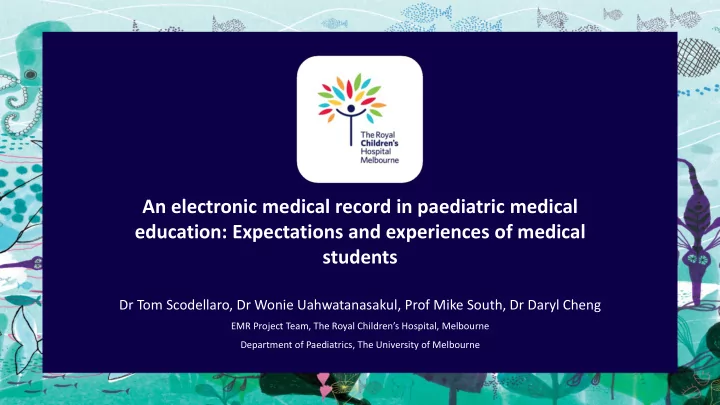

An electronic medical record in paediatric medical education: Expectations and experiences of medical students Dr Tom Scodellaro, Dr Wonie Uahwatanasakul, Prof Mike South, Dr Daryl Cheng EMR Project Team, The Royal Children’s Hospital, Melbourne Department of Paediatrics, The University of Melbourne
Declaration No conflicts of interest to declare
A great children’s hospital, leading the way
First paediatric EMR of its kind in Australia Centralised Integrated Accessible HIMMS Stage 6
To understand medical students’ expectations and experiences with an EMR system in a hospital setting
Previous Studies ⎯ + Undermine learning through Receive greater feedback inefficiencies (Rouf et al. 2008) (Hieman et al. 2014) Benefit from in-built resources Compromise patient contact and rapport (Keenan et al. 2006) (Rouf et al. 2008) Medical students are receptive to EMRs Exclude students from clinical tasks (Mintz et al. 2009) (Tierney et al. 1994) (Hammoud et al. 2007 )
Previous Studies ⎯ + Limitations Largely North American settings Undermine learning through Receive greater feedback Paternalistic inefficiencies (Rouf et al. 2008) (Hieman et al. 2014) Benefit from in-built resources Compromise patient contact and Rarely all-encompassing systems and settings rapport (Keenan et al. 2006) (Rouf et al. 2008) Medical students are receptive to EMRs Exclude students from clinical tasks (Mintz et al. 2009) (Tierney et al. 1994) (Hammoud et al. 2007 )
Methodology Formal training
Methodology Formal Expectations training survey
Methodology Formal Expectations 8 week training survey rotation
Methodology Formal Expectations 8 week Experience training survey rotation survey
Methodology Demographics Experience Ease of Use & Proficiency Learning Learning Resources Outcomes Communication
Response Profile Responses Male Median Age Expectations Survey 94 (87.0%) 51 (54.8%) Experiences Survey 87 (80.5%) 51 (59.3%) 24 (IQR 23-26) Overall 181 (83.8%) 102 (56.4%)
Experience & Proficiency Symphony,� 1 APeX� (UCSF),� 1 Genie,� 1 Majority reported previous Practix,� 1 BOSSnet,� 1 PCIS� (NT),� 1 experience (63, 67.7%) with non- DIPS� (Norway),� 2 integrated EMR systems Cerner� Powerchart,� 26 High self-assessed proficiency Best� Practice,� 16 ∝ Higher perceived ease of use ( p<0.001 ) ∝ Higher perceived ease & depth of Medical� Director,� learning ( p<0.001 ) 18
Ease of Use 5 4 score response� Met expectations to be easy to 3 Mean� learn , use and operate 2 1 Easy� to� learn� and� Easy� to� become� Easy� to� use operate skillful Expectation 3.862 3.787 3.84 Experience 3.897 3.793 3.851 P-Value 0.56 0.84 0.83
Learning Resources 5 4.5 Failed to meet expectations to 4 facilitate learning in specific areas 3.5 3 Access online information 2.5 2 Placing orders 1.5 1 Learn� more� about� ordering� Medication interactions Access� online� medication� Learn� more� about� medication� investigations� and� information� more� often interactions medications Expectation 3.851 3.904 3.851 Experience 3.483 3.402 3.161 Percent� Change -9.56% -12.86% -17.90% P-Value 0.005 0.001 0.001
Learning Outcomes 5 4.5 Marginally improved feedback from 4 3.5 clinicians, but not to expected levels 3 ( p= 0.02 ) 2.5 2 1.5 EMR enabled more robust 1 documentation than students 0.5 expected ( p=0.01 ) 0 Enable� more� complete� EMR� will� improve� feedback documentation Expectation 3.505 3.819 Experience 3.172 4.092 Percent� Change -9.50% 7.15% P-Value 0.02 0.01
Communication 5 4.5 4 Students did not expect nor 3.5 experience the EMR to reduce 3 patient interaction , visual contact or rapport 2.5 2 1.5 Enhanced students’ ability to 1 contribute to the clinical team Spend� less� time� Spend� less� time� Improve� overall� Improve� ability� to� talking� to� the� looking� at� the� rapport� with� the� contribute� to� patient patient patient team Expectation 2.484 2.598 3.14 4.138 Experience 2.69 2.92 3.011 4.198 P-Value 0.2 0.053 0.16 0.31
Key Findings
Key Findings Medical students readily engage with the electronic medical record
Key Findings Medical students readily engage with the electronic medical record Students recognise several advantages to the EMR in clinical practice
Key Findings Medical students readily engage with the electronic medical record Students recognise several advantages to the EMR in clinical practice Does not impair student- patient communication
Key Findings Medical students readily engage with the electronic medical record Students recognise several advantages to the EMR in clinical practice Does not impair student- patient communication Integrated resources did not meet expectations
Key Findings Medical students readily engage with the electronic medical record Students recognise several advantages to the EMR in clinical practice Does not impair student- patient communication Integrated resources did not meet expectations May not enhance learning or feedback to the degree expected
Key Findings Medical students readily engage with the electronic medical record Limitations Students recognise several advantages to Diversity of previous experience the EMR in clinical practice Relative measures of experience and Does not impair student- patient expectations communication Unique , integrated system Integrated resources did not meet expectations May not enhance learning or feedback to the degree expected
Optimisation
Optimisation Creation of a safe-prescribing e-learning module Development of specific templates for student documentation Created opportunities for students to be involved in the EMR team
Optimisation Future Directions Creation of a safe-prescribing e-learning module Development of specific templates for student documentation Created opportunities for students to be involved in the EMR team
Optimisation Future Directions Continue to involve students in EMR Creation of a safe-prescribing e-learning module Explore ways to use the EMR as an educational tool Development of specific templates for student documentation Further studies to Improve understanding of Created opportunities for students to be the EMR-student interaction involved in the EMR team Investigate how student involvement may benefit clinicians
www.rch.org.au/emr facebook.com/rchmelbourne @RCHMelbourne tomrscod@gmail.com
Recommend
More recommend